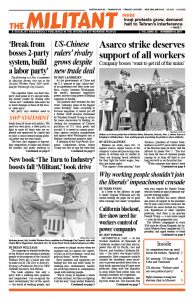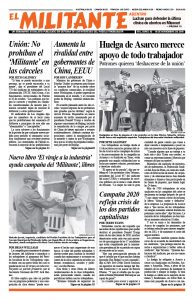November 21, 1994
DECATUR, Illinois — When Janey McKinney’s husband was locked out by A.E. Staley, a major producer of corn sweeteners, in June 1993, she said she had two choices: “Either lie down and get walked on or stand up and fight. And I’ve never been someone to lie down.”
McKinney and her husband Bob joined 150 locked-out workers and family members to become “Road Warriors,” traveling across the country to tell their story, reach out for support, and extend solidarity to other unions fighting their own battles.
Today with 1,800 members of the United Auto Workers on strike against Caterpillar, another 1,250 members of the United Rubber Workers on strike against Bridgestone/Firestone, and 762 members of United Paperworkers International Union locked out at A.E. Staley, more than 10 percent of the industrial working class of Decatur is on the picket lines.
November 21, 1969
One of the most immediate problems facing antiwar GIs — the right to on-post distribution of their publications — was slated to come before the Federal Court House in Clinton, North Carolina, the GI Civil Liberties Defense Committee announced.
The antiwar newspaper is entitled Bragg Briefs.
The argument is a crucial one; the decision on this case will affect dozens of bases where more than 60 different antiwar papers are being published. The issue at stake is the constitutional rights of American servicemen to freedom of speech and freedom of the press.
[The Army’s] reasoning is that the distribution of the paper would “constitute a clear danger to the loyalty, discipline and morale of the military personnel.”
Attorney [Leonard] Boudin will argue that the Army is invoking a process of censorship contrary to fundamental First Amendment rights.
November 18, 1944
A national conference of Canadian Trotskyists was held to discuss the major political and organizational tasks confronting the Trotskyist movement in Canada during the coming period.
Due to wartime repressions and restrictions, this was the first conference on a national scale which the Canadian Trotskyists have been able to convene in several years. It reflected the tremendous increase in the economic and political activity of the Canadian masses, who have been moving steadily leftward as shown by the huge growth in the trade union movement.
Representatives at the conference included active trade unionists. In the spirit of greatest optimism for the future of the revolutionary socialist movement in Canada and internationally, they discussed the perspectives of the working class and adopted a program of action in the coming period.

